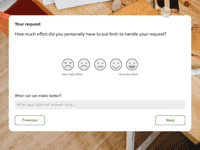Perhaps you do not notice that companies request their employees to do several surveys each year. The true idea behind these surveys is to study their staff from a variety of angles in order to assist HR management. And perhaps you are not aware that there are more types of employee surveys than we thought. Since companies often mix up these types in one survey to make it a one-stop analysis, you hardly tell the types apart. Together, let’s learn some of the most common types of staff surveys and the use case of each in this article.
The Overview of Employee Surveys
By definition, a survey is a method of collecting data from a sample group in order to estimate the characteristics of a larger population. In business, surveys are used extensively to gather information about customers, employees, and even the general public. Employee surveys specifically can be used to collect data about employee satisfaction, engagement, motivation, opinions on company policies and procedures, and more. Depending on the context and purposes, a survey is tailored accordingly to target the right respondents and acquire the most accurate insights from them.
As its name implies, a staff survey is a type that is specifically designed to gauge data regarding employee satisfaction, morale, motivation, engagement, etc., to ultimately serve the human resource management of an organization. Surveys of this kind usually take the form of questionnaires that employees need to answer truthfully and anonymously. The answers will then be gathered and analyzed to give employers an understanding of how their employees think and feel about different aspects of their work. In some cases, employees may also be asked to provide comments or suggestions on how they think the company can improve its policies, procedures, etc. Employee surveys are generally conducted periodically, either annually or every few years, in order to track any changes in employee opinions over time.
By running one or several of these surveys, you make your employees feel that they are being heard and their opinions are valued. This will help a company tighten its bond with its top performers. Also, the insightful data you gain from internal surveys like these will guide your business decisions to success. The key point is to select the right type for the right purpose and situation.
Different Types of Employee Surveys
The employee survey is an umbrella term, which means it covers a wide range of sub-types categorized by the specific purposes they aim to achieve. Surprisingly, there are more types of staff surveys than you can imagine. How about outlining some of the most popular ones?
Employee Satisfaction Surveys
As its name suggests, a satisfaction survey is cultivated to collect insights on how happy an employee is about his or her current position and every other thing regarding the company, ranging from compensation, benefits, company culture, workload, and more. This type of employee survey is conducted to help the HR department to track the level of employee satisfaction, thereby identifying any areas for improvement and making adjustments in a timely manner. By analyzing this metric, employers make necessary adjustments in company policies, enhance work conditions, and offer flexible benefits, eventually coming up with the proper methods to retain their employees. Hence, employee satisfaction surveys are essential for any organization to understand its personnel.
Employee Opinion Surveys
In this type of survey, the conductors aim to gather the personal opinions of employees on various aspects of a specific topic or event. An employee opinion survey is usually conducted when there are changes in company policy or procedures so that employees can give their two cents on the situation. For instance, your company might be considering a change in the way work is assigned, and you want to know how your employees feel about it. In another case, the management might want to hear suggestions from employees on how they think the company can improve its current methods. No matter what the purpose may be, an employee opinion survey allows businesses to seek feedback from their employees and factor it into their decision-making processes.
Employee Performance Surveys
The ultimate goal of performance surveys is to measure one’s job performance and offer proper rewards and recognitions, usually handled by the line manager or direct supervisor. In this survey type, both the quantitative and qualitative data in terms of productivity, work quality, attention, contribution, etc., are collected. Employers conduct performance surveys periodically and annually to assess how their staff is performing so that they give constructive feedback and praise, as well as encourage them to keep up good work or improve where possible. Furthermore, this type of survey also allows employers to compare the performance of different employees to pick out potential candidates for promotion.
Onboarding Surveys
This is a crucial part that should be included in any onboarding procedure. An onboarding survey is created to gather feedback from new hires on the company’s first-day process, somehow like a review. In particular, these types of surveys provide the HR team access to the experience of new employees on their very first days at work. Based on the answers from respondents, HR professionals can measure how the current employee onboarding process is performing and identify what they can do better next time. A typical onboarding survey contains questions about the clarity of the onboarding process, the quality of information and training received, and how welcomed the new employee felt by his or her colleagues. This type of survey should be included in the employee onboarding checklist to make sure you get real-time insights from new hires and enhance your process accordingly.
Employee Engagement Surveys
An engagement survey is designed to assess employee morale and motivation at work. This type of survey usually contains questions to delve into how employees feel about their workplace, how they work in their roles and toward the company’s goals, and how aligned they are with the company’s values and culture. The answers to these questions give employers an understanding of how engaged their employees are with their work and the company as a whole. By analyzing this data, businesses can make necessary changes to improve employee engagement, such as providing more opportunities for career growth, offering flexible work arrangements, and improving communication between employees and management. Normally, engagement surveys should be conducted frequently and in the form of pulse surveys. The type of employee survey will be defined and varied by the goals it aims to serve. Therefore, besides these, there are many more types of employee surveys, such as attitude surveys, organization culture surveys, professional development surveys, experience surveys, manager feedback surveys, 360 surveys, etc. Whatever types of employee surveys to take, employers have to sit down with their HR team to decide which one to use and work out how to create an engaging one. And guess what? A one-stop survey creator – bravoSURVEYS – will help you navigate the process with ease. This software tool enables users to tailor an eye-catching and engaging staff survey with little effort. Give bravoSURVEYS a try and create “bravo surveys” as you like!







